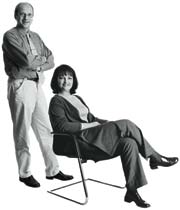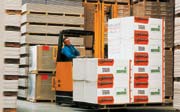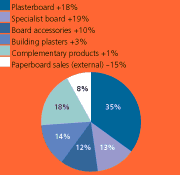
| Introduction | |
| Financial highlights | |
| Routes to market | |
| Chairman’s statement | |
| Chief executive’s review | |
| Operating review | |
| Finance director’s review | |
| Directors | |
For a printer friendly version of this Annual Report website plus PDFs of the rest of the document please visit the PDF download section . |
|
Internal linings
Plasterboard systems’ turnover, including sales of metal components and jointing materials used in dry lining construction, increased by 16% overall, with growth in group plasterboard volumes matched by sales of related products. Plasterboard production costs reduced, benefiting from our group-wide benchmarking programme, improved logistics from new capacity in developing markets, and our drive to manufacture more product with fewer people and lower overheads.
Turnover of ceiling tiles and decorative products, including cornice and mouldings, increased by over 10%. Our ceiling tile business now includes Gyptone and an expanding range of Casoprano tiles which are sold throughout Europe, with particularly strong demand in eastern Europe. Celotex’s range of US products will provide additional opportunities for further developments. We have also increased our presence in flooring products via the Rigidur brand and continue to develop our range of gypsum blocks, which represent an important structural interior solution for markets in southern and central Europe.
As a traditional method of interior finish, wet lining with plaster remains an important contributor of group profit and cash flow. Building plaster turnover increased by 8% at constant exchange rates, mirroring the growth in tonnage which was primarily driven by strong demand in the Iberian market. Selected investments in growing markets continued to be attractive, with a decision to increase plaster capacity in Italy and with expenditure on additional capacity at Puchberg in Austria which, after commissioning later this year, will supply plasters into eastern Europe.
| BPB group | 2000 | 1999 | % increase |
| Turnover (£m) | 1,426.8 | 1,315.3 | 8 |
| Operating profit (£m) | 230.4 | 173.9 | 32 |
| Margin (%) | 16.1 | 13.2 | |
| Building materials | 2000 | 1999 | % increase |
| Turnover (£m) | 1,318.4 | 1,187.1 | 11 |
| Operating profit (£m) | 210.1 | 163.8 | 28 |
| Margin (%) | 15.9 | 13.8 | |
| Paperboard | 2000 | 1999 | % increase |
| Turnover (£m) | 191.0 | 191.9 | — |
| Operating profit (£m) | 20.3 | 10.1 | 101 |
| Margin (%) | 10.6 | 5.3 | |
Paperboard
Operating profit doubled to £20.3 million with sales margin accelerating from 5.3% to 10.6%, the transformation, despite flat turnover, resulting from significant growth in group plasterboard liner volumes coupled with the achievement of lower operating costs. Third party UK sales fell by 15% due to business disposals and the stronger pound which attracted imports from mainland Europe where significant over-capacity remains. However, repositioning of the paperboard business continues, with the focus on meeting group requirements for high specification liner at the lowest possible cost. The reduction in third party sales was offset by a 30% increase in liner sales, which now represent more than 70% of total mill output.
Cost reduction continued, with some £10 million of improvements gained across the business from manufacturing process efficiencies, improved logistics and lower overheads, the latter continuing to benefit from the transfer of administrative functions to our UK service centre.
Profits of our paper sack business increased by almost a quarter due to improved operating efficiencies and lower input costs which offset selling price pressures.
However, our solid case operations had another difficult year, with the strength of sterling making it impossible for the business to remain viable. A suitable buyer was not found and, shortly after the year end, the closure of the UK business was announced.
The majority of our paperboard operations use recycled waste paper as their basic raw material. Prices are governed by world supply and demand issues, and after a period of relative stability increased in the second half, with further increases since the year end.
Formula
Formula, our industrial plasters business, sells worldwide from three principal European sites. Profits increased by more than one-third despite a decline in the traditional UK ceramics market, with increased sales demand in central Europe and Asia, and Formula’s promotion of new high value products for niche markets. Further efficiency improvements and overhead reductions contributed to better margins.
The acquisition of Thai Gypsum Products in the year has created opportunities to provide a full product range to the Asian market. In addition, the acquisition of Gypsum Turda in Romania provides a competitive source of plasters for eastern Europe.



BPB’s day-to-day supply to German merchants of Rigips plasterboard, Heidelberger Styropor expanded polystyrene, and other lining materials is co-ordinated by a sales and marketing team including Josef Graute, Rigips business development manager (top left), Manuela Beckers, telesales administrator (seated), and Dominik Bues, Heidelberger sales manager for Styropor.

Turnover by product segment %
99/00 changes compared to prior year
| [ 1 | 2 | 3 | 4 ] | continued >> |
[ back to top ]